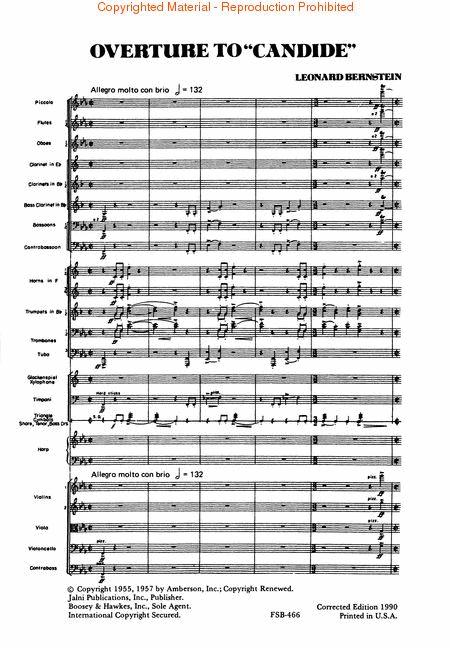

- #OVERTURE TO CANDIDE CLARINET SHEET MUSIC 3RD MOVIE#
- #OVERTURE TO CANDIDE CLARINET SHEET MUSIC 3RD FULL#

The “Mambo” was announced by thunderous percussion, whose vast forces distinguished themselves throughout the evening, and the audience managed to interject at the right time too. The “Cha-Cha” showed Denève’s eye and ear for the refined orchestration of what we might think of as a rather more fiery and earthy work. It certainly showed in this performance, with lots of Korngoldian lushness and lubrication in the famous “Meeting Scene” and Scherzo. The Brussels Philharmonic is noted for its strengths in performing and recording film music. The sound world of the Symphonic Dances is quite distinct: richer, fuller, rounder, with more complex textures than the drier, streetwise sound of the Broadway score.
#OVERTURE TO CANDIDE CLARINET SHEET MUSIC 3RD FULL#
With a little help from the audience: before setting the orchestra off Stéphane Denève reminded us to join in with the shout of “Mambo!” in the famous dance sequence, even giving us the opportunity to rehearse. The Symphonic Dances were arranged under Bernstein’s supervision for full symphony orchestra by Irwin Kostal and Sid Ramin, who had themselves scored the film version of the musical in 1961. The Symphonic Dances from West Side Story were the culmination of the concert, and one wondered how the orchestra could possibly up the ante. The final movement of the three – “Times Square: 1944” – had the requisite degree of sleaze: in this respect special mention should go to the Brussels Philharmonic’s principal clarinet, trombone and saxophone, who were deliciously indecorous. This is unapologetically brash music which reeks of sweat and bourbon and got feet tapping. The second half saw the brass and winds make their return to the stage for Bernstein’s Three Dance Episodes from On The Town, from a musical that is a love song addressed to New York City itself.


She’s a performer whose charismatic delivery echoes that of Bernstein himself, whose showoff nature is channeled by the violin part. Ferschtman has an enviable spiccato and a restrained, ornamental approach to vibrato that makes for a highly developed sense of musical line and phrasing. In the Rondo finale (“Socrates Alcibiades”) Denève and Ferschtman egged each other on, amping up the boisterousness with each return of the theme: you could practically smell the booze on Alcibiades’ breath. The third movement – a presto Scherzo based on the “Eryximachus” section – was delivered with deftness and élan. It’s a piece whose five moments are unified by resonant and ringing sounds – xylophone, tubular bells, harp and plucked strings – themselves counterposed by longer, more lyrical string lines. The orchestration puts the soloist in dialogue with string orchestra, percussion and harp, evocative of Bartók’s Music for Strings, Percussion and Celesta, though with a shade more warmth, as befits a piece ruminating on love in all its forms. Bernstein was aided in writing the solo part by the great Isaac Stern.
#OVERTURE TO CANDIDE CLARINET SHEET MUSIC 3RD MOVIE#
It would make an apt soundtrack for a movie of Proust’s À la Recherche du Temps Perdu, particularly in its coda, where clarinet and celesta evoke with eerie, frozen beauty the toy piano and music box of Connesson’s childhood.īernstein’s 1954 Serenade after Plato’s “Symposium” is as much philosophical reflection as it is concerto showpiece, though there are plenty of pyrotechnics, none of which fazed soloist Liza Ferschtman. This use of counterpoint reflects the thematics of the piece: the pain of lost time, of memory and of half-remembered desires tinged with nostalgia.


 0 kommentar(er)
0 kommentar(er)
